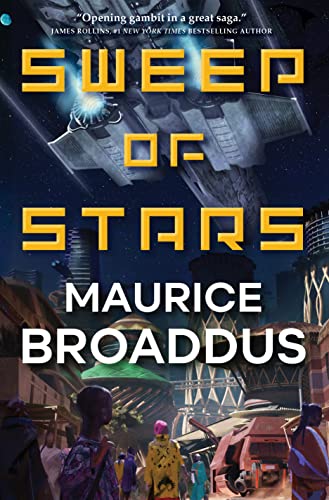Book Review: Sweep of Stars by Maurice Broaddus
Muungano isn’t an empire, at least not yet. It’s a strongly connected group of communities including the Dreaming City on the Moon, Bronzeville on Mars, Titan, and the far flung Oyigiyigi mining outpost. They’re tired together by a shared weusi culture dominated by peoples from the African countries that were, and those of African descent that were in the diaspora. In the year 2121 C.E., they are on the brink of interstellar travel. But there are forces from Original Earth that are dedicated to bringing Muungano under their control, problems within their own borders, and perhaps other problems. A time of crisis is approaching.

While it’s not made clear on the cover, this Afrofuturist novel is in fact the first book in a trilogy. It’s a “mosaic” story following multiple characters, cutting between them frequently and revealing the overall story only gradually. It also slips back and forth between first, second and third person narration, depending on the character in the spotlight.
The starting character is Amachi Adisa, previously Leah Adisa, who is “you” in narration. She’s been adopted into the Adisa family, the patriarch of which, Xola, is current Camara (speaker) of the Ijo (people of Muungano.) It’s her naming day, when she will take her place as a full member of her people. (It’s made clear a bit later that she’s not a teenager, one of her contemporaries is a starship captain with an adolescent son.) The ceremony loses its party aspect when it’s learned that Muungano’s Earth embassy has been bombed.
This begins a series of attacks, setbacks and other problems, some of which are connected, and a few of which might not be traced to enemy action.
The culture of Muungano is both the book’s strongest and weakest point. The author needs to have the characters demonstrate how it works and what the culture considers important, since in many ways it’s different from what the reader might be used to. This produces rich passages of interaction. In Muungano, it seems, everyone is always learning, everyone is creative, everyone is musical, everyone is working in community.
However utopian it is, the culture is also shown to have some glitches. Some important people have…difficult personalities and strong opinions, and often need to be navigated to get things done or have your own ideas heard. And the system throws up malcontents who find that Muungano isn’t as inclusive as it thinks, and are easy prey for someone who will “appreciate” them more.
But this level of detail sometimes bogs down the action and renders dialogue more of a mishmash of ideas than a means of conveying information. I was relieved to have some soldiers in a combat situation that requires them to be direct and relatively economical in speech.
One thing I noticed was a certain amount of “black and white”, and not quite in the way that might sound. (There’s a token Thai-heritage character among the viewpoints.) But everyone we meet in the novel who works for “Original Earth” is a confirmed puppy-kicker.
I do appreciate that there is a glossary in the back, both for words from various African languages and future slang.
Time travel is a background event–happened once by accident, may be happening again.
Since this is only the first volume of a trilogy, there are plot elements that don’t join up properly by the end. It remains to be seen if those are deliberate mysteries or not. There’s a lot of pieces in play.
Of most interest to those interested in Afrofuturism as a movement, and the possibilities it looks into.

